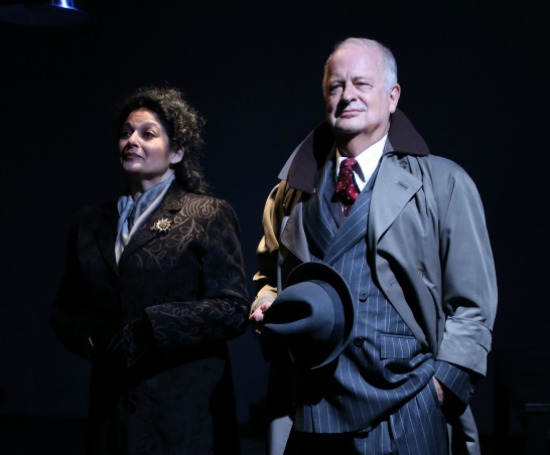
The Resistible Rise of Arturo Ui isn’t usually considered Brecht’s best play. It’s the complex story of a Chicago gangster who rises to power through control of the vegetable trade. The plot is overly complicated. There’s no hero appearing throughout the play with whom we can identify, as there is in The Good Woman of Setzuan, or Saint Joan of the Stockyards. Brecht fails to involve us either intellectually or emotionally in this play. In its current production of the play, the Phoenix Theater Ensemble has gone to great lengths – very successfully – to be true to both Brecht’s theory of verfremdungseffekt and the play’s specific historical application. They’ve put the script in the context of a radio play. There are three old-fashioned microphones on stage, and the performers read into them at first. Then the actors are freed to live in the fiction, but the shell of the radio broadcast materializes from time to time. Sometimes we see them rattle a metal sheet for thunder. Arturo Ui is an extended metaphor for the rise of Hitler. At the play’s opening, characters are announced, with a picture of the specific Nazi leader associated with each projected on the upstage wall as the character is introduced. Projections, in fact, are present intermittently throughout the play – mostly headlines and pictures of Hitler. There’s a page in the program, as well, that explicates the correspondence between elements of the play and the rise of Hitler. Arturo Ui himself corresponds to Hitler, Dogsborough (Chicago businessman and politician) to Hindenburg, vegetable sellers to the bourgeoisie, even a fire that takes place in the play to the Reichstag fire. It’s great that The Phoenix gives us help here. The company uses ten performers to play more than 30 characters. Their work is very good, but more actors would have been helpful in keeping the minor characters distinct. Craig Smith is terrific as Arturo Ui. He stutters and rasps. His fingers fidget and his body at times is nearly in a spasm. As Dogsborough, John Lenartz is very fine as well. He also has a comic role in a great scene as an actor hired to give Ui a lesson in public speaking. Ui learns well, and Mr. Smith’s physicalization at the play’s closing, when he gives a public speech, is an eloquent comment on crowd-pleasing. He’s a master of representational acting. Ui gives a great reason for learning proper comportment to impress a crowd. He says “They’re all snobs, the great unwashed, the huddled masses.” We get another first-rate performance from Elise Stone as Betty Dullfleet, wife of a rival snuffed out by Ui. She’s excellent in smaller roles as well. Kevin Confoy directs Stephen Sharkey’s translation masterfully. His adaptation is felicitous. His actors are Brechtian puppets, as they need to be. He gives great attention to detail and gesture and is totally in control of each eloquent stage picture. The talents of the company are undeniably formidable, but in the final analysis, nothing could make this script really work. The parallels to Nazism would have been more interesting when it was written, in 1941. Still, the Phoenix Theater Ensemble likely had no way of knowing when they planned their season what application an American production of this “gangster parable” would have in November of 2016.
